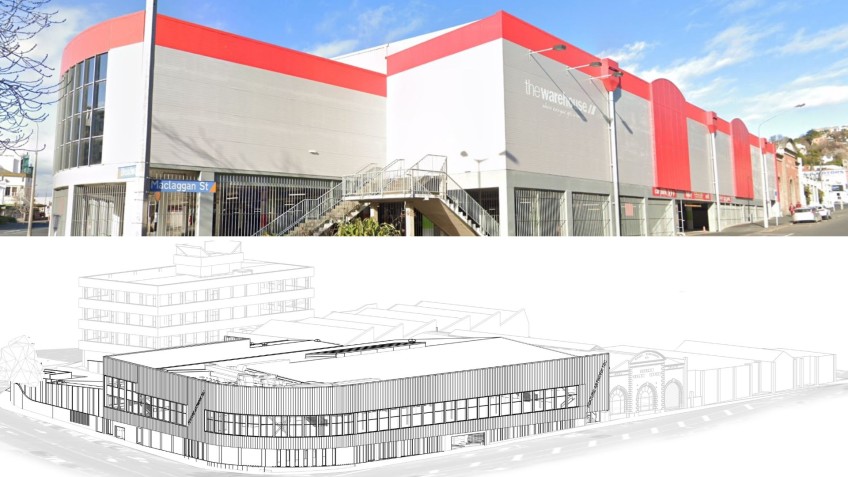Councillors push go on $56m ORC HQ

The Otago Regional Council needs a new home in Dunedin and making the 100-percent ratepayer-owned Port Otago its landlord is an “elegant” solution, says Queenstown-based councillor Alexa Forbes.
At its first meeting for the year on Wednesday, councillors gave greenlight for the port company to convert a former store of The Warehouse in central Dunedin into a new council office building.
Councillor Forbes says a decision on where to house council staff is long overdue, and Wednesday's move is the right one.

Councillor Alexa Forbes: Having Port Otago as a landlord is an 'elegant' solution to housing the ORC in Dunedin.
“There’s been lots of talk, lots of councils not getting on with it, and lots of wasted money, looking at this site, that site, the other site, and deciding that it wasn't going to work.”
The current set-up, with staff working across several different buildings, is inefficient and “utterly untenable”, she says.
“We have to house them in a fit-for-purpose building, and we’re getting on with that.”
But fellow Dunstan councillor Michael Laws says the decision, made in a section of the meeting closed to the public, was not a unanimous one.
He's made no secret of the fact he doesn’t prioritise a new headquarters for the ORC in Dunedin, however it’s delivered.
It’s unnecessary spending of ratepayer money and “proof positive of the Dunedin-centric focus of the council when much of its work is in the wider region”, he says.
He’s also unsure about the arrangement that's been met with Port Otago, calling the rent figures discussed “market-plus”.
In 2021, Port Otago acquired the warehouse on Maclaggen Street with the intent to have it re-purposed for the ORC’s needs.
It’ll spend $45 million doing that (already $7 million more than estimated two years ago when it purchased the building, because of growing construction costs, inflation and rising interest rates).
The ORC, as the tenant, will then step in and spend $11.2 million to fit out the building for its requirements.
There’s money already put aside for this, and it will be bolstered by proceeds of a deal to sell another patch of land – the Birch and Kitchener Street site – orginally flagged for the ORC’s Dunedin HQ, to Port Otago for $7.9 million.
Going forward, the ORC will pay Port Otago $2.6 million a year rent to occupy the spruced-up building (although, that rent’s already jumped $339,000 since the plan was first conceived).

Councillor Michael Laws: There's a strong view the 'market rent" per square metre far exceeds what other commercial landlords are charging in Dunedin.
But Councillor Laws is questioning how the council can know it’s a good commerical arrangement when there’s nothing to compare it to.
“We might have gone to the commercial property market, outlined our operational needs, and effectively tendered for a commercial landlord offering that service.
“I would wager the annual rent cost would be well below $2.6 million per annum.”
They're sentiments echoed by Dunstan councillor Gary Kelliher, who’s asking why ratepayers shouldn’t expect mates' rates – after all they’re set to be both landlord and tenant.
Instead, the port’s offering “very commercial” rents on what’s quickly becoming an expensive project, he says.
“The port are going to undertake the building and supposedly guarantee the upper limit, but it’s morphed itself per square metre into one of the most expensive buildings in Dunedin.”
Now, ratepayers own the Stafford Street building much of the council work from, while others are housed in Philip Laing House, which the council leases floors of.
“But, geez, it’s a big jump for the benefit of having everyone sitting together. The ratepayers are suddenly funding two-and-a-half million dollars on a lease, and that will go up at normal commercial rent reviews,” Councillor Kelliher says.
“My beef, really, is…ratepayers suffer yet again.”
However Councillor Forbes is welcoming the new fixed costs, saying they bring little risk to ratepayers and plenty of certainty.
“It’s a strong governance structure, and it doesn’t have impact on year-to-year rates, so that’s a good thing.”
It makes sense to team up with Port Otago for the project, she says.
“They do commercial property – this is what they do.”
Any gains the company makes through the commercial arrangement with the council “are held within the port and the council’s balance sheets”, she says.

Councillor Gary Kelliher: 'It’s a big jump for the benefit of having everyone sitting together'.
“I can’t see a better way of structuring it, if you ask me, we just have to get on with it. Many, many millions have been wasted not getting on with it.”
Port Otago Otago’s property division develops three to four large sites annually and has a property portfolio of more than $600 million across the country.
In a written statement Port Otago chief executive Kevin Winders says the redeveloping the former warehouse for the council’s purposes is a cost-effective solution, “considerably less than new-build options”.
It will “create a modern workspace for council staff at lower cost and lower risk to the ORC and ratepayers”, and it will help revitalise that part of the city, he says.
“Port Otago will manage the project and take on the construction risk, allowing the ORC to continue to focus on delivering their critical work for the Otago region.”
He confirms the ORC will be a long-term tenant of the building, paying a market rental, with any surplus earnings from the rental, less funding costs and tax, available to be returned to the ORC by way of dividend.
The new council house is being called Whare Rūnaka, and ORC interim chief executive Pim Borren says the fit-for-purpose building is necessary for the council to “achieve the ambitious work programme” in front of it.
“Currently our team of more than 300 staff are spread across multiple sites in the city in three different, temporary, offices which is less than ideal,” Dr Borren says.
The agreement with Port Otago is for a 40-year lease - initially for 20 years, then two 10-year right-of-renewals.
Construction is expected to be completed by the end of next year.
Main image (ORC supplied and Google): A former retail store on Maclaggan Street in central Dunedin will be refurbished by Port Otago to house the Otago Regional Council.



























